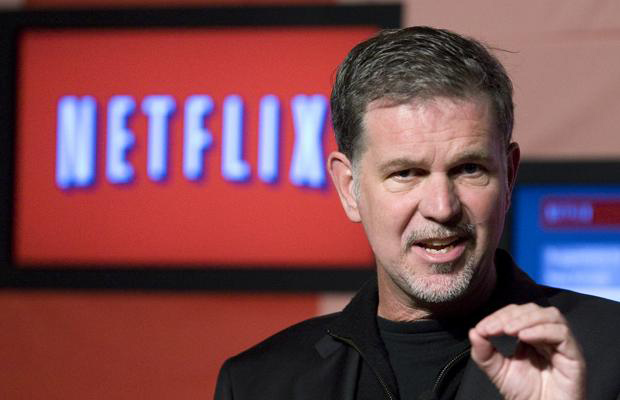Streaming video company Netflix is dependent on connecting with ISP networks like Comcast’s to reach their subscribers, and that has become an issue for the company as it has recently been forced to pay for interconnect fees. Today at Re/code’s inaugural CODE Conference, Netflix CEO Reed Hastings made the case for what it calls a free and open Internet.
While Netflix has grown its user base thanks to its new original programming over the past year, it’s also gotten into a high-profile spat with cable provider Comcast over a paid interconnection deal it recently struck.
Sources tell us Netflix was actually able to lower its costs thanks to cutting out the middleman in its Comcast connection. And Comcast subscribers are getting much better streaming speeds since the two companies began connecting directly with one another.
The company, however, continues to make its case that ISPs like Comcast shouldn’t charge both content providers and broadband subscribers to connect with one another. And it’s publicly opposed the Comcast-Time Warner Cable acquisition as a result.
At the CODE Conference, Hastings continued to press for what Netflix calls “strong net neutrality.”
“The basic argument is that we’re big believers in the free and open Internet,” Hastings said, which includes the idea of settlement-free interconnect deals.
Hastings went on to explain that 10 years ago, ISPs like Comcast would pay providers like Cogent and Level 3 for transit, and then five years ago they stopped paying. Now, he says, ISPs demand that Internet companies pay to connect to their networks.
Of course, the contrarian opinion is that Netflix makes up a third of peak Internet traffic, and that ends up putting a strain on ISP networks that someone has to pay for.
“The key is the principle… If they charge a little bit now, they will charge more and more and more [over time],” Hastings said. “The fundamental question is who’s going to pay for the network? It’s the ISP,” Hastings said.
Despite that spat, Netflix has seen strong growth over the past year, particularly as it has ramped up the number of original, exclusive series available to its subscribers. But Hastings said the company would continue to add to that original programming over time.
Viewership of original series House of Cards, Orange Is The New Black, Arrested Development, and others has driven membership higher in recent quarters, leading Netflix to end the first quarter with 35.7 million subscribers in the U.S. and an additional 12.7 million internationally.
But it’s not stopping there: It’ll have new seasons of existing shows that include Orange Is The New Black, Hemlock Grove, and Derek, while adding series like kid-focused Marco Polo, Marvel’s Daredevil, Wachowski sci-fi drama Sense 8, and action-drama series Narcos from Brazilian director José Padilha. The company is also in talks to acquire rights to British Royal historical drama The Crown, as well as a new TV series based on the movie Wet Hot American Summer.
“The content that we have coming this year will completely dwarf what we had last year,” Hastings said.
While Netflix has seen a lot of success with original programming, no other major streaming player has done that well surprisingly enough. Hastings said its competitors include cable networks like HBO, FX, and Showtime, as well as big Internet companies.
But cable networks aren’t great at streaming, and the big Internet companies aren’t great at creating new original content. Netflix, meanwhile, has hit a sweet spot thanks to having about a third of its staff in L.A. to acquire new content.
The strategy has worked so far, so Netflix looks to continue with it.
